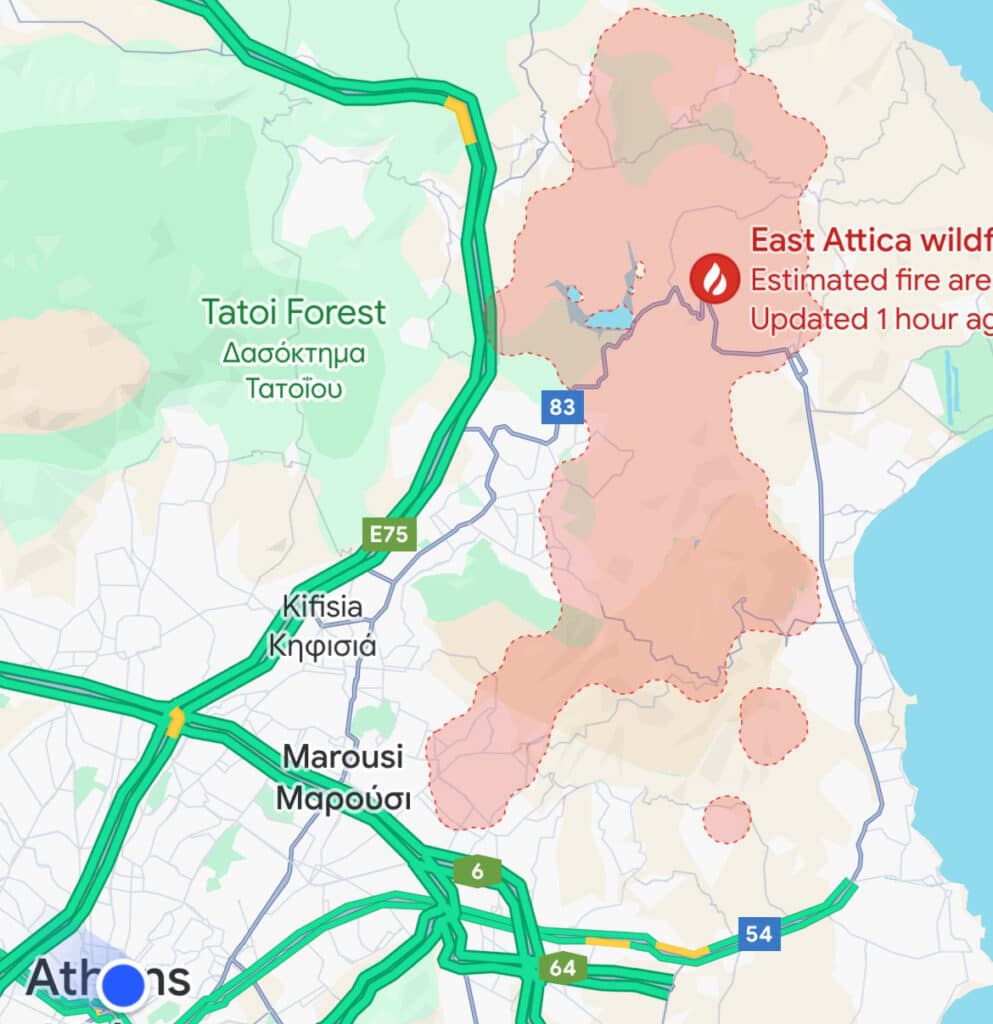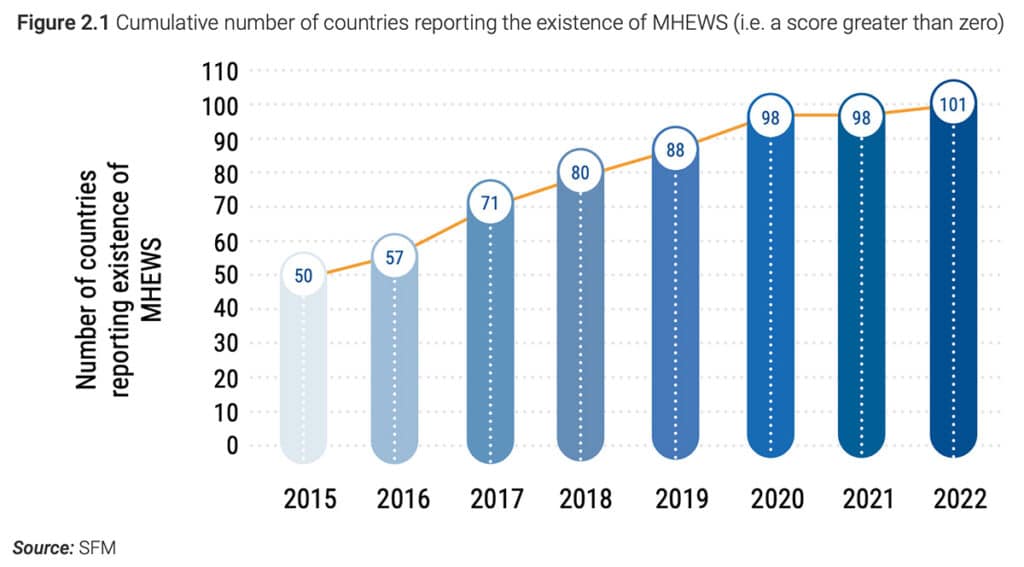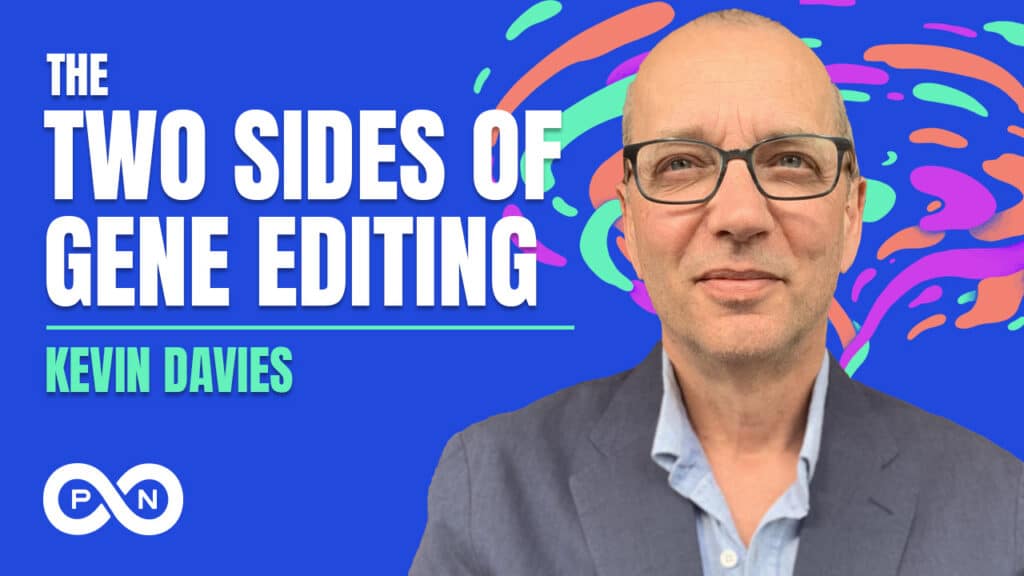Volcanoes are erupting in The Philippines, but on-fire Australia received some welcome rain. The Iran war cries have been called off and The Donald’s military powers are about to be hamstrung by the Senate. Meanwhile, his impeachment trial is starting, and we’re all on Twitter for a front-row seat.
What Could Go Right? Every Second Counts
Better early warning systems for weather and natural disasters are saving lives.
This is our weekly newsletter, What Could Go Right? Sign up here to receive it in your inbox every Thursday at 5am ET. You can read past issues here.
Every Second Counts
Last week, I was working in a café near my apartment in Athens, Greece, when the emergency alert system on everyone’s phones blared. A wildfire with 80-foot flames, borne by gale-like winds, had reached the northern suburbs of the city. Several neighborhoods were being evacuated. For whatever reason, my phone hadn’t received the alert, so I wasn’t sure how close the fires were. But I figured that there was no need to panic, as everyone around me remained nonchalant.
It wasn’t until later in the day, when smoke had blanketed the center of Athens and I had closed all of my windows and doors to avoid breathing it in, that I realized I should be better aware of where exactly the fires were. Opening Google Maps to look up the location—I hadn’t recognized the name of the area on the news—I was surprised to find a live “wildfire map” showing the edges of the conflagration.

All of this would not have been possible until very recently. Member states of the European Union were required by law to have set up such cell phone-based alert systems only since 2022. Google piloted wildfire tracking via satellite in the United States in 2019, tested adding machine learning to the tracker in 2023, and launched it internationally in 2024. Greece was added to the list of countries that it’s available in just last month.
These tools and others like them—for forecasting, emergency response, and public communication—are crucial when it comes to saving lives and preventing or lessening damage in the event of natural disasters and severe weather. In countries that don’t have what the United Nations (UN) calls multi-hazard early warning systems (MHEWS), disaster-related mortality rates are six times higher, and have five times more disaster-affected people per capita, than in countries that do.
The impact of early warning systems is precisely why the UN has called for ensuring that every person on Earth be protected by them by the end of 2027.
The bad news is that that goal will be nearly impossible to meet. The good news is that more and more countries are reporting having MHEWS—101 of them as of 2023, double the number since 2015.

According to the United Nations Office for Disaster Risk Reduction (UNDRR), the Asia and Pacific region, as well as Africa, has seen dramatic improvement in expanding MHEWS coverage. It remains low in the Americas and the Caribbean, however, as well as in Africa’s poorest countries and in Arab states. Advances in science and technology have made forecasts faster and more accurate, giving people more lead time to respond. And there has also been a rise in international cooperation, with better-resourced countries sharing forecasts and weather analyses with lower-resourced ones.
In May of 2023, for instance, tropical cyclone Mocha made landfall on the Bangladesh-Myanmar border, where millions live in refugee camps. Guided by information from a meteorological center in New Delhi, India, authorities in Bangladesh and Myanmar evacuated 500,000 people. There were only five casualties, according to the UNDRR. In the past, there had been thousands.
The world overall has become more skilled at evacuations, with 119 million more people evacuated in 2021 than in 2015. This is a reflection of more effective preemptive action, not necessarily bigger disasters, says the UNDRR, since numbers evacuated are directly proportional to how robust a country’s early warning systems are.
These systems are a main reason why deaths from weather-related disasters have fallen threefold since 1970, even though there has been a fivefold increase in the disasters themselves, due to climate change and better reporting. Climate change’s role in worsening certain severe weather and making it more frequent looms urgently over the effort to build up countries’ early warning systems as fast as possible.
Only 54 countries have the phone alerts, which can target people based on their location, that resounded across the café I was in last week in Athens. Only 22 can access the Google wildfire maps. And those are just two basic examples of all of the information and coordination that is needed before, during, and after hazardous events.
We’ll likely never exist in a world in which we have escaped the effects of them entirely. But we have come a long way in mitigating them, and can do a lot more.
What Could Go Right? S6 E18

Where should humans draw the line with gene editing? Is CRISPR the “holy grail” of science, or is editing human DNA ethical at all? Zachary and Emma speak with Kevin Davies, executive editor of The CRISPR Journal and author of Editing Humanity. They discuss gene editing, specifically CRISPR, and its implications for mankind’s future, the successes of gene editing for agriculture and treating sickle cell disease, and Chinese biophysicist He Jiankui’s unlawful meddling in the DNA of three embryos, now kids living in China with unknown health effects. | Listen now
By the Numbers
17.5%: The share of Chile’s electricity output produced using coal, down from 43.6% in 2016. Chile is phasing out coal faster than any other developing nation.
2.9%: The annual US inflation rate last month, the lowest it has been since March 2021.
93%: The share of Americans who would vote for a well-qualified woman for president, up from 54% in 1958.
11: The number of African countries that have now introduced malaria vaccines.
Quick Hits
🦠 Come September, you can test yourself for syphilis: the Food and Drug Administration (FDA) just approved the first at-home syphilis test (WaPo $). Results need to be confirmed by a healthcare provider, however. And soon, women will be able to obtain a sample to be checked for HPV, the precursor to cervical cancer, using a swab at home and skipping the speculum normally used in a Pap smear. The FDA will likely approve these kits this fall. (NYT $)
🏳️🌈 A court in Beijing has awarded visitation rights to a mother estranged from her child’s other mother. It is the first time a court in China has recognized that a child can have two legal mothers and is being hailed as a milestone for LGBTQ rights there. The mother, however, was not granted the right to visit the couple’s second child, who she did not physically birth.
👽 Scientists know that Mars used to have oceans but theorized that most of its water had been lost to space. Using data from the robotic explorer InSight Lander, however, they have now calculated that vast quantities of water could be trapped miles below the planet’s surface, renewing hopes that there may be life there.
🧠 A small study showed that a treatment called adaptive deep brain stimulation (DBS), which uses electrodes implanted in the brain, could ease the motor symptoms associated with Parkinson’s disease. While DBS has been around for some time, adaptive DBS is new and enables “the level of stimulation to be automatically adjusted in response to a patient’s needs, based on real-time signals in the brain.”
🤰 The past decade has seen a transformation of the success rate of uterus transplants, for the recipient, the grantee, and the resultant babies. “It’s a complete new world,” one transplant surgeon told STAT News.
🧬 Is there anything GLP-1 agonists can’t do? Researchers are now finding that the class of drugs that contain Ozempic and Wegovy may also stave off cancer. On his Substack, science communicator Scott Alexander digs into why these drugs seem to work for so many things.
🏠 Home energy rebates legislated into law by the Inflation Reduction Act are slowly becoming reality. Fifty states plan to apply to receive the federal funds, 23 states have already applied, 10 state applications have been approved, and two—New York and Wisconsin—are actually beginning to roll out the rebates to customers.
🐊 What humans decide to do with their time on earth is amazing. Researchers in Western Australia are teaching freshwater crocodiles that toxic cane toads cause food poisoning in an attempt to stop them from eating the toads during periods of infestation, a sometimes fatal error. The “taste aversion training” involves baiting a crocodile to eat toads that have been injected with a nausea-inducing chemical.
⚡ In a world first, electric maintenance vessels in the Belgian North Sea are being charged by power from an offshore wind farm. The charging cable is also deployed automatically, for safety.
👀 What we’re watching: In November, voters in California and Nevada will decide whether to amend their state’s constitution to remove language authorizing the use of slavery and involuntary servitude as a criminal punishment. Eight states, red and blue, have already done so.
💡 Editor’s pick: Are we living in a time of unparalleled wealth inequality? A provocative essay argues yes.
TPN Member Originals
(Who are our Members? Get to know them.)
- Politicians should talk to the press more | Slow Boring | Matthew Yglesias
- The end of apathy | The Edgy Optimist | Zachary Karabell
- On the ballot: American manhood | WSJ ($) | Richard V. Reeves
- Art of the plea deal | No Mercy/No Malice | Scott Galloway
- The riots in the UK | Tangle | Isaac Saul
- How to give a great compliment | The Atlantic ($) | Arthur C. Brooks
- Emotions help us think straight | NYT ($) | David Brooks
- Harris gonna code switch | NYT ($) | John McWhorter
 Economist Philipp Carlsson-Szlezak on dealing with macroeconomic risk | Faster, Please! | James Pethokoukis
Economist Philipp Carlsson-Szlezak on dealing with macroeconomic risk | Faster, Please! | James Pethokoukis- America’s out-of-control client states | Nonzero | Robert Wright
- How libraries are becoming ‘sustainable’ | Our Towns | Deborah Fallows
 Getting educated on a clean energy future | CGEP | Jason Bordoff
Getting educated on a clean energy future | CGEP | Jason Bordoff Is Ukraine ready to end the war? | GZERO | Ian Bremmer
Is Ukraine ready to end the war? | GZERO | Ian Bremmer


